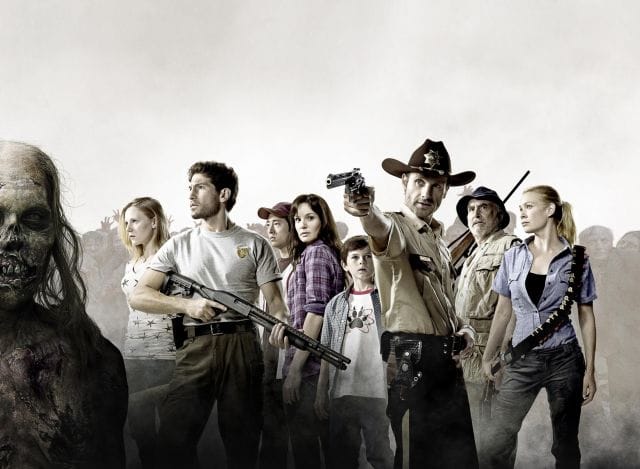Episodes: Why The Walking Dead is so huge

(How young we all were!)
The sixth season of The Walking Dead is finally showing the slightest signs of viewer fatigue with the program. The ratings are down, just a little bit, and you can sort of see where the show will end somewhere around season 10 or 11, as the ratings continue to slide and the series becomes more expensive to produce.
But this is still one of the biggest shows on TV, even first-run. And its rise was really remarkable. It grew, season to season, over five straight years, drawing in new viewers with every season. And this isn't a situation like Breaking Bad, where it started really small, then got big at the end. No, it started big, got huge (in season two), then got even bigger with each successive season. Its run is really remarkable, and the only thing that's really comparable to it is probably Game of Thrones (where we'll see if season six brings a slight ratings tapering). But even that hasn't yet reached the heights of Walking Dead.
The popular explanation for The Walking Dead's success is that people love zombies. But I'm not sure that really explains it. It probably explains the initial season one audience, but the series' growth from season to season suggests highly that it broke out of the horror and zombie crowd and attracted a more general audience. Certainly horror stories do this from time to time, but it's rare for a zombie story, specifically, to do so. They tend to appeal to a very specific subset of the horror audience.
Certainly what works in film doesn't work on TV sometimes and vice versa (just ask all the superhero shows that are struggling along right now), but it feels like the answer here goes beyond "people like zombies."
I've also heard people say that the show's success stems from the general apocalyptic mood we're all in. And maybe that's true? But lots of apocalypse shows have come and gone in the last 15 years, and very few have stuck. Certainly none have stuck to the degree that this show has.
So let me postulate something different. The success of Walking Dead stems almost entirely from something I talked about last week: it's a show about people who aren't always on TV, namely Southerners, namely rural Southerners. The show has taken a while to reach the level of racial diversity it currently has (where it's still pretty white-heavy for the South but at least has a nicely diverse cast compared to a lot of shows), but it was always, always about the sorts of rural Americans we just don't see TV shows about.
And here's something that led even more to the show's success: because it's a Western on a structural level, it plays into a lot of the myths rural America tells itself about what it stands for. The characters are "good," and the "bad" characters are easy to spot. Even when the show goes in for moral complexity (as it is right now), it's of the sort where the good guys are still good; they just sometimes get the wrong idea. The Walking Dead is a show about a world full of binary choices, rather than shades of grey, and those are the kinds of stories that have always played best in America's less urban corners.
I'm not trying to sound patronizing here either. Black and white choices make a lot of sense in these contexts, because so many of the conflicts are ultimately about life and death. Your crops are either thriving, or they're dying, lots of the time. There isn't really a status where they just sort of struggle along, yielding meager results, because when that happens, they might as well be dead for all the good they do you.
One of the things I often wonder is just how much of, say, existential worry or even psychological consideration is an extension of privilege, of the fact that you have enough money to think about the inner state of your mind. Certainly that's not how it should be, but that's how we often treat it. The social safety net in these situations is often at the community level. And that plays into The Walking Dead, too.
When you look at the shows that are hugely successful over the last ten years, many of them have that rural inflection. Think of Duck Dynasty, for instance. These shows are often regarded as weird curiosities, driven by social systems that we coastal media elites can't understand. But they're easy enough to understand if you shift your thinking to the point of view of someone who lives in these regions and never sees themselves on TV. The Walking Dead isn't perfect, but it's telling a bunch of people a story they want to hear. And that story, in some ways, is about who they imagine themselves to be.
--
Episodes is published at least three times per week, and more if I feel like it. It is mostly about television, except when it's not. Suggest topics for future installments via email or on Twitter. Read more of my work at Vox Dot Com.




